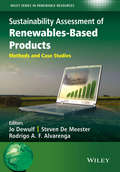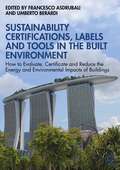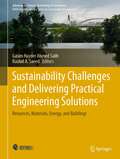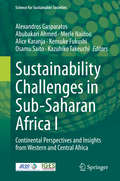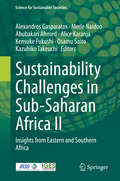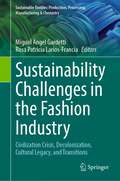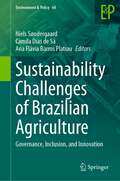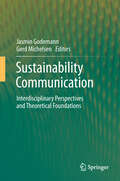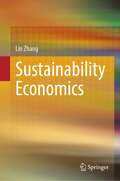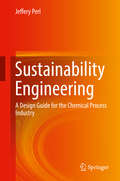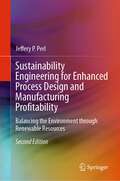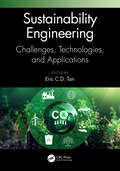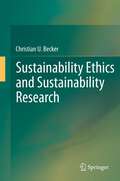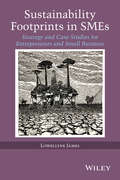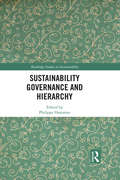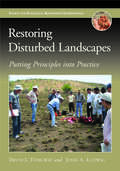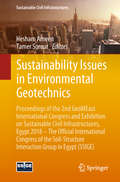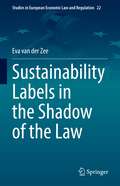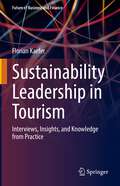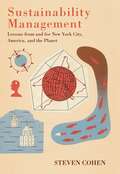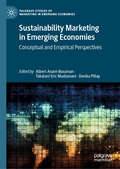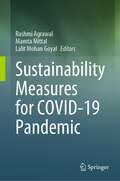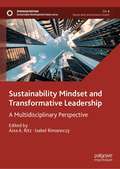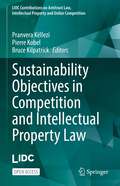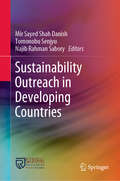- Table View
- List View
Sustainability Assessment of Renewables-Based Products
by Jo Dewulf Steven De Meester Rodrigo A. AlvarengaOver the past decade, renewables-based technology and sustainability assessment methods have grown tremendously. Renewable energy and products have a significant role in the market today, and the same time sustainability assessment methods have advanced, with a growing standardization of environmental sustainability metrics and consideration of social issues as part of the assessment. Sustainability Assessment of Renewables-Based Products: Methods and Case Studies is an extensive update and sequel to the 2006 title Renewables-Based Technology: Sustainability Assessment. It discusses the impressive evolution and role renewables have taken in our modern society, highlighting the importance of sustainability principles in the design phase of renewable-based technologies, and presenting a wide range of sustainability assessment methods suitable for renewables-based technologies, together with case studies to demonstrate their applications. This book is a valuable resource for academics, businesses and policy makers who are active in contributing to more sustainable production and consumption. For more information on the Wiley Series in Renewable Resources, visit www.wiley.com/go/rrs Topics covered include: * The growing role of renewables in our society* Sustainability in the design phase of products and processes* Principles of sustainability assessment* Land use analysis* Water use analysis* Material and energy flow analysis* Exergy and cumulative exergy analysis* Carbon and environmental footprint methods* Life Cycle Assessment (LCA), social Life Cycle Assessment and Life Cycle Costing (LCC)* Case studies: renewable energy, bio-based chemicals and bio-based materials.
Sustainability Certifications, Labels and Tools in the Built Environment: How to Evaluate, Certificate and Reduce the Energy and Environmental Impacts of Buildings
by Umberto Berardi Francesco AsdrubaliThis book is aimed at covering all aspects of the evaluation, certification, and reduction of the energy and carbon footprint of the built environment from the scale of the city and its neighbourhoods, to the building level and finally to the level of single building materials and components. Many protocols, tools, and labels have been proposed in recent years, both at international and local levels, and the aim of the book is to classify, describe, and discuss all the different approaches and options.The chapters offer a comprehensive, up-to-date, and critical review of all the different certification methods that have been proposed at different levels in the building sector. The first chapter introduces the topic and its importance, providing data on the impact of the building sector and the construction industry. The following chapters are dedicated respectively to tools and protocols for cities and neighbourhood sustainability assessment, tools and protocols for buildings sustainability assessment and certification, and for building materials and components. Finally, this book includes an overview of the legislation and standards in the field and case studies to exemplify the application of the different tools and labels.This is a key reference for decision-makers, researchers, scholars, students, and professionals approaching research and work in the field of energy and environmental impact of the building sector be they engineers, architects, planners, owners, developers, or facility managers.
Sustainability Challenges and Delivering Practical Engineering Solutions: Resources, Materials, Energy, and Buildings (Advances in Science, Technology & Innovation)
by Gasim Hayder Ahmed Salih Rashid A. SaeedThis book highlights the recent findings and advances in science engineering technology and sustainability issues. It aims to discuss, reflect and share experience in addressing the findings in science engineering technology and sustainability. The book aims to report the various interrelated disciplines from different institutions to discuss, reflect and share technology and experience in addressing new findings and strategies. This book presents the proceedings of the Science Engineering Technology and Sustainability International Conference (SETS2021) which was held virtually—as sustainable virtual conferences become the new normal—during December 23–25, 2021. This book is presenting latest research findings, and it is suitable for researchers, postgraduate students, professionals and experts. The book includes interesting and top research in fuzzy modeling and decision-making applications in computer science. Several chapters address trending research about bioremediation and phytoremediation. There are mainly three research findings that cover artificial intelligence, sustainability and new technologies.
Sustainability Challenges in Sub-Saharan Africa I: Continental Perspectives and Insights from Western and Central Africa (Science for Sustainable Societies)
by Alexandros Gasparatos Kensuke Fukushi Osamu Saito Kazuhiko Takeuchi Abubakari Ahmed Merle Naidoo Alice KaranjaThe aim of this 2-volume book is to highlight how Sustainability Science approaches can help solve some of the pervasive challenges that Africa faces. The volumes collect a number of local case studies throughout Africa that adopt transdisciplinary and problem-oriented research approaches using methodologies from the natural and the social sciences. These are put into perspective with chapters that introduce key sustainability challenges such using a regional focus. Through this multi-scale and inter/transdisciplinary approach the proposed volume will provide an authoritative source that will pack in a single volume a large amount of information on how Sustainability Science approaches sustainability challenges in African contexts. While there have been general books about sustainability science, none has had a strong African focus. As a result the 2-volume set fills a major gap in the Sustainability Science scholarship. This volume sets the stage for the series. Part I introduces key sustainability challenges in Africa. Parts II‐III highlights specific case studies related to these challenges from West and Central Africa.
Sustainability Challenges in Sub-Saharan Africa II: Insights from Eastern and Southern Africa (Science for Sustainable Societies)
by Alexandros Gasparatos Kensuke Fukushi Osamu Saito Kazuhiko Takeuchi Abubakari Ahmed Merle Naidoo Alice KaranjaThe aim of this two-volume book series is to highlight some of the most pervasive sustainability challenges that Sub-Saharan Africa faces. The two volumes contain 20 chapters that illustrate very diverse sustainability challenges throughout the continent, adopting interdisciplinary and problem-oriented research approaches, and methods from the natural and the social sciences. The very diverse case study chapters are put into perspective with chapters that introduce key sustainability challenges using a regional focus. Through this multi-scale and interdisciplinary approach the two volumes provide an authoritative source about the major sustainability challenges in the continent, and how to mobilise such perspectives to develop appropriate solutions. The two volumes have a uniquely broad focus that fills a major gap in the emerging Sustainability Science scholarship. Parts I-II highlight specific case studies on major sustainability challenges from Eastern and Southern Africa. Part III synthesizes the main lessons learnt from the chapters in the two edited volumes.
Sustainability Challenges in the Fashion Industry: Civilization Crisis, Decolonization, Cultural Legacy, and Transitions (Sustainable Textiles: Production, Processing, Manufacturing & Chemistry)
by Miguel Ángel Gardetti Rosa Patricia Larios-FranciaFashion, and the growth of fashion, are presented as the manifestation of a process of civilization, within a capitalist culture (capital understood as material possessions) that has become global and imperialist, of which - in an economic sense - the industry (or the fashion system?) functions as one of its main instruments of exploitation. And with respect to design, Arturo Escobar said: "Can design detach itself from its roots in modernist practices of unsustainability and defuturization and reorient itself towards other commitments, practices, narratives and ontological enactions? Moreover, can design be part of the toolkit for the transition to the pluriverze (i.e. a world in which many worlds can fit)?" This book presents the importance of cultural sustainability in the textiles and fashion industry, decolonizing fashion system and promotes the design for transitions.
Sustainability Challenges of Brazilian Agriculture: Governance, Inclusion, and Innovation (Environment & Policy #64)
by Niels Søndergaard Camila Dias de Sá Ana Flávia Barros PlatiauWith contributions from a wide range of thematic areas, this book provides a diverse perspective on the contemporary environmental challenges of Brazilian agriculture. Assessing existing experiences of governance interventions, implementation of inclusive and sustainable production practices, as well as technical innovations, this edited volume presents the reader with a nuanced perspective on sustainable future pathways for Brazilian agriculture. In many cases, actors within the agricultural sector stand in a key position to address environmental concerns, which often has generated important breakthroughs and improvement of production practices. Drawing on contributions from authors within a variety of fields, this contribution presents a trans-disciplinary perspective on the problems and pathways through which multi-level interventions can lead to sustainable solutions within the Brazilian agricultural and livestock sector. This book hereby constitutes an informed and timely contribution to the important debates about Brazil’s potential role in confronting environmental problems. More broadly, this volume also sheds light on the process of agricultural transitions in the Global South, and how food security concerns may be reconciled with sustainable production.
Sustainability Communication
by Gerd Michelsen Jasmin GodemannModern and professional communication is required to realise the goal of sustainability in society. This book develops a theoretical and empirical framework, integrating interdisciplinary perspectives from communications theory, psychology, sociology, educational sciences, systems theory and constructivism. Its aim is to inform the establishment of sustainability communication. Complementing this theoretical framework, the book provides methods and concepts in a range of fields such as corporate practice, education and media. The book addresses the scientific community and students as well as communicators in all categories of sustainability communication.
Sustainability Economics
by Lin ZhangThis book is an essential guide to understanding and tackling the complex challenges of sustainable development.It provides a thorough analysis of economic principles and their application to pressing sustainability issues. Covering everything from foundational theories and energy dynamics to environmental impacts and social justice, it provides actionable insights into how businesses, policymakers, and communities can drive sustainable progress. With a focus on real-world applications, it explores the latest in energy efficiency, climate policy, and green finance, making it a critical resource for students, professionals, and anyone passionate about creating a more sustainable future. Whether you're looking to deepen your understanding of sustainability economics or seeking practical strategies for implementing sustainable practices, this book offers a rich blend of theory, analysis, and practical guidance.
Sustainability Engineering
by Jeffery PerlThis book explores sustainability engineering through the lens of the manufacturing and chemical process industries to elucidate the safe and economic implementation of process designs used to transform raw materials into useful finished products. The author applies the tenets of sustainability science to develop an engineering methodology that supports the perpetual availability of raw materials through recycling/reuse/repurposing, incorporates inexhaustible supplies, such as solar energy and municipal waste, and encompasses the husbandry of these resources in a manner that minimizes negative environmental impacts. Anyone involved in the design or manufacture of chemicals, or the upgrade of existing manufacturing processes, will benefit from this book's suggestions for identifying improvement options, while adding the pivotal aspect of sustainability to the usual cost and safety equation optimization elements.
Sustainability Engineering for Enhanced Process Design and Manufacturing Profitability: Balancing the Environment through Renewable Resources
by Jeffery P. PerlNow in an expanded and revised second edition, this book explores sustainability engineering through the lens of the manufacturing and chemical process industries to explain the safe and economical implementation of process designs to transform raw materials into valuable finished products. The author applies the principles of sustainability science to engineering methodology for residential, commercial, and industrial applications that support the perpetual availability of raw materials through recycling, reuse, and repurposing to incorporate inexhaustible supplies and encompasses the management and conservation of these resources in a manner that minimizes negative environmental impacts. New sections include:Coverage of electric power opportunities and challenges (solar, wind, and cogeneration),Efficiency improvement as an energy supply extender, Recycling as a material extender. The book examines relevant energy policies driving and affecting commercial, industrial, and residential energy utilization and includes new industrial case studies. Anyone involved in the design or manufacture of chemicals or the upgrade of existing manufacturing processes will benefit from this book’s suggestions for identifying improvement options while adding the pivotal aspect of sustainability to the usual cost and safety equation optimization elements.
Sustainability Engineering: Challenges, Technologies, and Applications
by Tan, Eric C.D.Sustainability Engineering: Challenges, Technologies, and Applications focuses on emerging topics within sustainability science and engineering, including the circular economy, advanced recycling technologies, decarbonization, renewable energy, and waste valorization. Readers will learn the trends driving today’s sustainability research and innovation as well as the latest in sustainable process technologies. This book: Addresses emerging sustainability development challenges, progress, and disruptive technologies Discusses biological sustainability, recycling technologies, and sustainable process design and manufacture Features a comprehensive view from renowned experts who are leaders in their respective research areas This work is aimed at an interdisciplinary audience of engineers and scientists working on solutions to advance the development and application of sustainable technologies, including – but not limited to – chemical and environmental engineers.
Sustainability Ethics and Sustainability Research
by Christian BeckerThe book identifies the specific ethical aspects of sustainability and develops ethical tools to analyze them. It also provides a methodological framework to integrate ethical and scientific analyses of sustainability issues, and explores the notion of a new type of self-reflective inter- and transdisciplinary sustainability research. With this, the book aims to strengthen the overall ability of academics to contribute to the analysis and solution of sustainability issues in an inclusive and integrated way.
Sustainability Footprints in SMEs
by Lowellyne JamesReviews the evolution and theory of Sustainability Footprints e.g. carbon footprint and examines the critical success factors and contributions to small to medium sized enterprises (SME) growth* Assist firms in achieving sustainable growth in four key areas Innovation Impact, Cost Impact, Environmental Impact, and Stakeholder Impact* Identifies the challenges and Critical Success Factors (CSFs) in the use of sustainability footprint methodology within small businesses by the use of case studies* Proposes a strategic model suitable for the deployment of sustainability strategy and initiatives within business
Sustainability Governance and Hierarchy (Routledge Studies in Sustainability)
by Philippe HammanSustainability Governance and Hierarchy provides a solid, theoretically and empirically grounded reflection on the concept of "sustainability governance". This idea has been growing in popularity in social science literature, as well as among decision-makers and governance actors, as it brings together two vast fields of study that have sometimes been dismissed as vague or ideologically loaded. In order to link the concepts of "sustainability" and "governance", the book is organized around the exploration of hierarchy issues, which often lie in the background of the existing literature but are not the focus of analysis. The chapters reflect ongoing controversies and dialogue between scientists with different theoretical and thematic backgrounds, who are all willing to participate in and contribute to a constructive effort to reach a more inclusive and more theoretically relevant stage for sustainability studies, being content with merely global analyses. The book is an innovative contribution to the hierarchy/non-hierarchy debate regarding governance arrangements in the field of sustainability and sustainability studies. This book will be of interest to advanced students and scholars focusing on governance issues, sustainability studies, environmental studies, as well as on the methodological aspects of the social sciences (economy, geography, law, philosophy, political science, sociology, urbanism and planning).
Sustainability Indicators: A Scientific Assessment (SCOPE Series #67)
by Tomás Hák Arthur Lyon Dahl Bedrich MoldanWhile the concept of sustainability has been widely embraced, it has been only vaguely defined and is exceedingly difficult to measure. Sustainability indicators are critical to making the broad concept of sustainability operational by providing specific measures by which decision makers and the public can judge progress. Sustainability Indicators defines the present state of the art in indicator development. It presents a comprehensive assessment of the science behind various indicators, while placing special emphasis on their use as communications tools. The contributors draw on their experience as academics and practitioners to describe the conceptual challenges to measuring something as complex as sustainability at local, regional, national, and global scales. The book also reviews existing indicators to assess how they could be better employed, considering which indicators are overused and which have been underutilized. Sustainability Indicators will help planners and policy makers find indicators that are ready for application and relevant to their needs, and will help researchers identify the unresolved issues where progress is most urgently needed. All readers will find advice as to the most effective ways to use indicators to support decision making.
Sustainability Issues in Environmental Geotechnics: Proceedings of the 2nd GeoMEast International Congress and Exhibition on Sustainable Civil Infrastructures, Egypt 2018 – The Official International Congress of the Soil-Structure Interaction Group in Egypt (SSIGE) (Sustainable Civil Infrastructures)
by Hesham Ameen Tamer SorourThis edited volume deals with the attempts made by the scientists and practitioners to address contemporary issues in geoenvironmental engineering such as characterization of dredged sediments, geomaterials and waste, valorization of waste, sustainability in waste management and some other geoenvironmental issues that are becoming quite relevant in today's world especially in view of the high urbanization rates, advancement in technologies, and changes in consumption behavior of people. In this regard, wastes generated through the daily activities of individuals and organizations pose many challenges in their management. The volume is based on the best contributions to the 2nd GeoMEast International Congress and Exhibition on Sustainable Civil Infrastructures, Egypt 2018 – The official international congress of the Soil-Structure Interaction Group in Egypt (SSIGE).
Sustainability Labels in the Shadow of the Law (Studies in European Economic Law and Regulation #22)
by Eva van der ZeeThis book describes and examines three EU legal frameworks (EU competition law, EU consumer law, and EU fundamental rights law) that may affect the extent to which consumers purchase more sustainably. In doing so, this book goes beyond a rationalist understanding of the interpretation and application of EU law. Rational approaches have severely impacted the interpretation and application of EU law. Practice shows, however, that the implications of using a noncritical application of rationalist approaches in the interpretation and application of EU competition law, EU consumer law, and EU fundamental rights law to sustainability labels may have an inhibiting effect on sustainable consumption. The book offers remedies to overcome this inhibitive effect by critically applying insights from cognitive science and behavioral economics in the legal interpretation and application of EU law.
Sustainability Leadership in Tourism: Interviews, Insights, and Knowledge from Practice (Future of Business and Finance)
by Florian KaeferThis professional guidebook highlights sustainable tourism development and management for businesses and destinations. It presents a unique collection of expert interviews, combined with latest insights and thoughts on the most relevant topics and trends linked to sustainability in tourism, sustainable business management, and destination development. This is a book which offers inspiring personal stories and reflections, and at the same time serves as essential know-how guide for busy tourism entrepreneurs, managers, and developers who care about business resilience and the well-being of destination communities.
Sustainability Management: Lessons from and for New York City, America, and the Planet
by Steven CohenCan we grow our world economy and create opportunities for the poor while keeping the planet intact? Can we maintain our vibrant, dynamic lifestyles while ensuring the Earth stays productive and viable? Aimed at managers, students, scholars, and policymakers, Sustainability Management answers these questions in the affirmative, arguing it is possible for environmentally sustainable business practices and policies to foster economic and long-term growth. Written by a former analyst and consultant with the EPA, this book originally combines sustainable efforts in water, agriculture, urban, and power management to achieve-in practice, not just in theory-a sustainable planet and economy. Steven Cohen begins with the technical, financial, managerial, and political challenges of such a project, and then honestly assesses sustainable practices in the manufacturing and service industries. He addresses renewable and carbon-free energy production; water sustainability, especially with regard to energy issues involving filtration, distribution, and changing rainfall patterns; food cultivation and distribution; and ways to maintain the interdependent systems on which we depend to live. Taking examples from New York City, one of the most sustainable and sustainability-minded metropolises in the world, Cohen explains how everything from construction to waste management can be designed to facilitate a sustainable environment, not just for New York but also for the world. He concludes with this macroscopic view, outlining the global efforts necessary to preserve biodiversity and ecosystems, and the impact of war, terrorism, and human conflict on sustainability.
Sustainability Marketing in Emerging Economies: Conceptual and Empirical Perspectives (Palgrave Studies of Marketing in Emerging Economies)
by Albert Anani-Bossman Takalani E. Mudzanani Devika PillayThis book addresses the environmental, social, and economic challenges that corporations in emerging economies face, focusing on sustainability marketing as a paradigm-shifting approach. Drawing from cases across several emerging economies, including South Africa, Ghana, Nigeria, and Turkey, it examines how organisations can create long-term societal value through sustainable practices. Reflecting the increasing pressure for organisations to adopt sustainability practices, the need for this book is rooted in what organisations in emerging economies stand to gain from the adoption and implementation of sustainable marketing strategies. Chapters address consumer behaviour and demonstrate best practices for integrating sustainability into marketing strategies. The opportunities and challenges associated with implementing sustainability strategies post-COVID are also explored. This book, therefore, offers essential pathways and shares evidence of sustainability marketing. Covering topics such as the sustainability marketing mix, social marketing, sustainable consumption, and the role of communication, it is a valuable contribution to the ongoing discussion on sustainability from the perspective of emerging economies.
Sustainability Measures for COVID-19 Pandemic
by Mamta Mittal Lalit Mohan Goyal Rashmi AgrawalThis book focuses on sustainability issues post COVID-19 outbreak, discusses ways to restrict global spread of the pandemic, and also how to survive holistically in the environment. It also discusses the economic impacts on the world due to the coronavirus outbreak. There is a strong need for monitoring and analysis of pandemics for sustainability like epidemic risk analysis by using pattern recognition or the mental health challenges during an outbreak. This book presents ways to find solutions and gives insights to explore innovative methods and predictive modeling techniques, such that masses are prevented from pandemics.
Sustainability Mindset and Transformative Leadership: A Multidisciplinary Perspective (Sustainable Development Goals Series)
by Isabel Rimanoczy Aixa A. RitzThis volume examines the importance of leadership in developing an effective sustainability strategy. It defines the sustainability mindset and surveys the primary motivations, conditions, or environment(s) that cause leaders to embrace sustainable practices. As described in the UN Sustainable Development Goal 8, embracing the sustainability mindset will lead to greater productivity and promote economic growth.Organized into themes of organizational operations, leadership competencies, and leadership practices, the chapters, written by contributors representing global perspectives, tackle topics such as strategy, culture, and leadership styles in developing a new form of mindfulness for leaders as well as organizations. Recognizing the need for accelerated change in organizations as well as society at large, this book presents scholars with a framework for establishing a mindset for sustainability to foster much-needed transformative leadership.
Sustainability Objectives in Competition and Intellectual Property Law (LIDC Contributions on Antitrust Law, Intellectual Property and Unfair Competition)
by Bruce Kilpatrick Pierre Kobel Pranvera KëlleziThis open access volume of LIDC contributions focuses on how competition and intellectual property laws incorporate sustainability objectives. Businesses are increasingly embracing sustainability objectives, driven by the international community. Although competition and intellectual property law are certainly not the only tools for addressing sustainability issues, they can play a role in moving toward a more sustainable society.Sustainability has gained prominence in competition law in all jurisdictions covered in this volume. The contributions focus on classic questions such as whether sustainability agreements restrict competition and, if so, to what extent businesses can be exempted on efficiency grounds. The papers also raise a number of questions, in particular concerning the treatment of non-market efficiencies. The soft law and case law produced by competition authorities are examined, and the leadership role of some competition authorities in the field – from advocacy to policy papers and sustainability guidelines – is highlighted. The authors call for more individual guidance to provide enhanced transparency and clarity to industry, advisors and society at large on sustainability issues, with guidelines or sustainability-related block exemptions providing even greater legal certainty.With regard to intellectual property, the contributions examine various important issues, such as the need for intellectual property rights to remain technology-neutral, ways to promote the use of sustainable technologies and incentives for licensing, and ways to promote the dissemination of sustainable technologies, including compulsory licensing, cross-licensing, open source or FRAND licensing, and replacing the destruction of counterfeit goods with recycling. The papers also discuss greenwashing and how it can be addressed through revisions to trademarks and related rights.
Sustainability Outreach in Developing Countries
by Tomonobu Senjyu Mir Sayed Shah Danish Najib Rahman SaboryThis book presents a comprehensive collection of recent research on the timely topic of sustainable development goals, with a focus on developing countries. In this manner, it furnishes interdisciplinary coverage in terms of sustainable development; it sets forth the pillars of sustainability (environmental, technical and technological, social, institutional, and economic disciplines); and it explores the adaption of these pillars for long-term sustainability.With its survey of transboundary research, experiences, and lessons learned, the book offers integrated conceptual and empirical contributions from diverse interrelated fields. Viable options are set forth for societies in transition in the twenty-first century to achieve well-being in the lives of their people through the eradication of poverty, mitigation of climate change, promotion of lifelong learning opportunities, and empowerment of society. These options also make it possible to deploy affordable energy, sustain economic growth, offer innovation, reduce inequality, and finally, to help ensure global sustainability.
